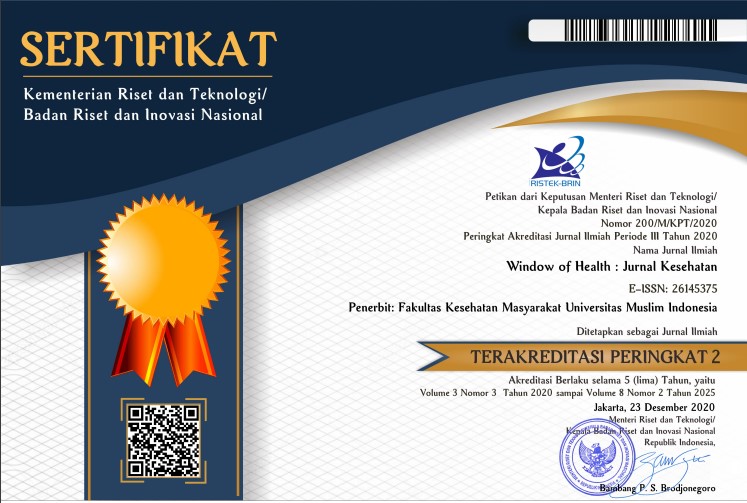The Relationship Between Self-Empowerment and Quality of Life in Type 2 Diabetes Mellitus Patients in Enrekang Regency
Abstract
Efforts to increase the self-empowerment of type 2 diabetes mellitus patients must be supported by solid motivation so they can develop their abilities so that they are able to care for themselves and empower themselves, the data found at the Masalle Health Center found that as many as 74 people with type 2 diabetes mellitus in 2020. Research aims to determine the relationship between self-empowerment and quality of life in patients with type 2 Diabetes Mellitus. The type of research used in this study was an analytic study with a cross-sectional design. The population of this study was type 2 diabetes mellitus sufferers in the working area of the Masalle Public Health Center, Enrekang Regency, as many as 74 74 people and samples in this study were type 2 diabetes mellitus in the working area of the Masalle Public Health Center, Enrekang Regency, who were drawn by total sampling technique. Quality of life was collected using the Diabetes Quality Of Life (DQOL) questionnaire and self-employment. Powerment was collected using the Diabetes Empowerment Scale Long Form (DES-LF) questionnaire. Data were processed using SPSS and analyzed using a chi-square test. The results showed a relationship between self-empowerment and the quality of life of type 2 diabetes mellitus patients with p=0.036 <0.05. The study concludes that there is a relationship between self-empowerment and the quality of life of people with type 2 diabetes mellitus, meaning that the better the self-empowerment, the better the quality of life of people with diabetes mellitus. Type 2 Diabetes Mellitus sufferers are advised to always achieve self-empowerment by increasing self-confidence to increase their quality of life.
References
2. Journal JN, Kepatuhan H, Dengan P, Gula K, Sewaktu D, Pasien P, et al. Hubungan Kepatuhan Pengobatan Dengan Kadar Gula Darah Sewaktu Pada Pasien Diabetes Melitus Tipe II Muhammad. 2019;1(1):11–8.
3. Selatan DKPS. Profile Kesehatan Provinsi Sulawesi Selatan. J Chem Inf Model. 2018;53(9):1689–99.
4. Nian Afrian Nuari MK. Self-Empowerment. Peningkatan Self Empower Dan Kualitas Hidup Pasien Diabetes Mellit Tipe Ii Dengan Pendekatan Dee Berbas Heal Promot Model. 2015;38(2):104.
5. Vermitia. Vermitia. Dukungan Kel Miskin Perkota Pada Pasien Diabetes Melitus Tipe 2. 2015;53(9):1689–99.
6. Hudatul Umam M, Solehati T, Purnama D. Gambaran Kualitas Hidup Pasien Dengan Diabetes Melitus Di Puskesmas Wanaraja. J Kesehat Kusuma Husada. 2020;(January):70–80.
7. Teli M. Quality of Life Type 2 Diabetes Mellitus At Public Health Center Kupang City Kualitas Hidup Pasien Diabetes Melitus Tipe 2 Di Puskesmas Se Kota Kupang. 2017;(1):119–34.
8. Sormin MH, Tenrilemba F. Analisis faktor yang berhubungan dengan kualitas hidup pasien diabetes melitus tipe 2 di Uptd puskesmas Tunggakjati Kecamatan Karawang Barat tahun 2019. J Kesehat Masy. 2019;3(2):120–46.
9. Funnell MM, Anderson RM. Empowerment and Self-Management of Diabetes. Clin Diabetes. 2004;22(3):123–7.
Copyright (c) 2023 Sri Syatriani

This work is licensed under a Creative Commons Attribution-NonCommercial-ShareAlike 4.0 International License.








